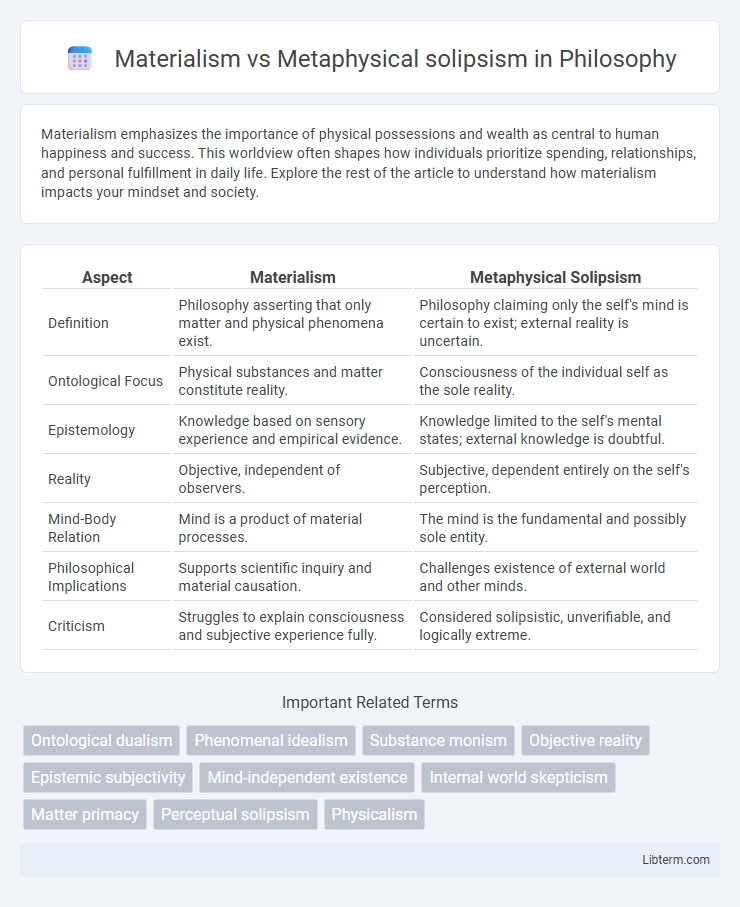Materialism emphasizes the importance of physical possessions and wealth as central to human happiness and success. This worldview often shapes how individuals prioritize spending, relationships, and personal fulfillment in daily life. Explore the rest of the article to understand how materialism impacts your mindset and society.
Table of Comparison
| Aspect | Materialism | Metaphysical Solipsism |
|---|---|---|
| Definition | Philosophy asserting that only matter and physical phenomena exist. | Philosophy claiming only the self's mind is certain to exist; external reality is uncertain. |
| Ontological Focus | Physical substances and matter constitute reality. | Consciousness of the individual self as the sole reality. |
| Epistemology | Knowledge based on sensory experience and empirical evidence. | Knowledge limited to the self's mental states; external knowledge is doubtful. |
| Reality | Objective, independent of observers. | Subjective, dependent entirely on the self's perception. |
| Mind-Body Relation | Mind is a product of material processes. | The mind is the fundamental and possibly sole entity. |
| Philosophical Implications | Supports scientific inquiry and material causation. | Challenges existence of external world and other minds. |
| Criticism | Struggles to explain consciousness and subjective experience fully. | Considered solipsistic, unverifiable, and logically extreme. |
Introduction to Materialism and Metaphysical Solipsism
Materialism asserts that physical matter is the fundamental substance of reality, with all phenomena, including consciousness, arising from material interactions. Metaphysical solipsism posits that only one's own mind and experiences are certain to exist, casting doubt on the existence of an external material world. This contrast highlights materialism's reliance on objective physicality versus solipsism's emphasis on subjective mental existence.
Historical Background of Materialism
Materialism, tracing its roots to ancient Greek philosophers like Democritus and Epicurus, posits that matter is the fundamental substance in nature, shaping reality and consciousness. During the Enlightenment, thinkers such as Thomas Hobbes and John Locke advanced materialism by emphasizing empirical observation and rejecting supernatural explanations. This historical evolution laid the groundwork for modern scientific materialism, contrasting sharply with metaphysical solipsism, which asserts that only the self's mind is certain to exist.
Origins and Development of Metaphysical Solipsism
Metaphysical solipsism originated from early philosophical inquiries into the nature of reality and self, notably influenced by Descartes' radical doubt and the Cartesian cogito. It developed through the existential and phenomenological traditions, emphasizing the primacy of individual consciousness and questioning the existence of an external world independent of the mind. Key figures such as George Berkeley and later proponents in analytic philosophy further explored solipsism, contrasting sharply with materialism's assertion of a mind-independent physical reality.
Core Principles of Materialism
Materialism asserts that all phenomena in the universe arise from physical matter and its interactions, emphasizing empirical evidence and scientific methodology as the basis for understanding reality. It denies the existence of non-physical substances or entities, contrasting sharply with metaphysical solipsism, which posits that only the self's mind is certain to exist. Core principles of materialism include the primacy of matter over mind, causality rooted in physical processes, and the rejection of supernatural explanations.
Fundamental Tenets of Metaphysical Solipsism
Metaphysical solipsism asserts that only one's own mind and conscious experiences are fundamentally real, positing the external world and other minds as mere projections or illusions. It emphasizes the indivisibility of subjective experience as the sole undeniable reality, rejecting the independent existence of matter posited by materialism. This ontology centers on the primacy of self-awareness, challenging the materialist view that physical substance constitutes the basis of all existence.
Materialism: Mind and Matter Explained
Materialism posits that all phenomena, including the mind, arise from physical matter and its interactions, asserting that consciousness is a product of brain activity. Neuroscientific studies support this view by identifying correlations between mental states and neural processes, reinforcing that mind functions depend on material substrates. This perspective contrasts sharply with metaphysical solipsism, which claims only the self's mind is certain, rejecting the independent existence of matter and other minds.
Solipsism: The Nature of Consciousness and Reality
Metaphysical solipsism posits that only one's own mind and experiences are certain to exist, framing consciousness as the sole foundation of reality. It challenges materialism by rejecting the independent existence of the external world, emphasizing that reality is fundamentally a construct of individual perception. This view highlights the intimate connection between subjective awareness and the existence of all phenomena, questioning objective reality's validity beyond personal consciousness.
Comparative Analysis: Materialism vs Metaphysical Solipsism
Materialism asserts that physical matter is the only reality, emphasizing observable phenomena and scientific evidence as the basis of existence, while metaphysical solipsism posits that only the self's mind is certain to exist, denying the independent reality of the external world. Materialism relies on empirical data to explain consciousness and the material universe, whereas metaphysical solipsism centers on subjective experience and questions the existence of anything beyond individual perception. This comparative analysis highlights materialism's grounding in objective reality against solipsism's radical skepticism about external existence.
Critiques and Challenges of Both Worldviews
Materialism faces critiques for its inability to fully explain consciousness and subjective experience, often being challenged by the "hard problem of consciousness." Metaphysical solipsism encounters skepticism due to its radical claim that only one's mind is certain to exist, which undermines common sense and scientific validation of an external world. Both worldviews struggle with balancing ontological assertions and epistemic justification, leading to ongoing debates in philosophy of mind and metaphysics.
Contemporary Relevance and Ongoing Debates
Materialism, which asserts that physical matter constitutes the only reality, remains dominant in scientific and philosophical discourse due to its empirical basis and practical applications. Metaphysical solipsism, positing that only one's own mind is certain to exist, challenges materialism by raising enduring questions about consciousness, subjective experience, and the nature of reality, fueling ongoing debates in philosophy of mind and epistemology. Contemporary relevance centers on discussions about artificial intelligence, virtual reality, and the limits of scientific knowledge, where solipsism's focus on the primacy of individual experience contrasts sharply with materialism's objective framework.
Materialism Infographic

 libterm.com
libterm.com